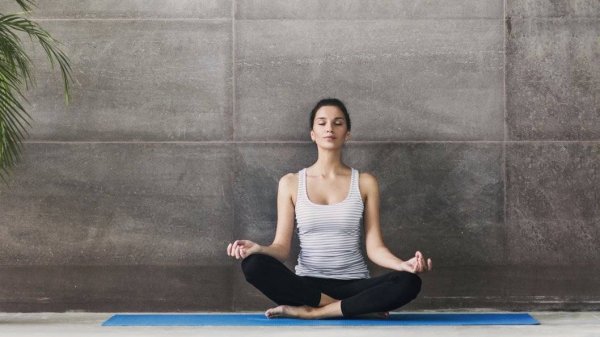This extended period of solitude is tough on everyone’s mental health. While some people are living with their families, some are facing this period all by themselves. The restriction of movement, loss of jobs, isolation, long working hours, and the worry that comes with a pandemic is causing unprecedented stress and anxiety. If you feel the same, and are wondering how to deal with depression, you’re far from alone. To help us navigate our way around this, we spoke to neuropsychiatrist and life wellness coach, Dr Era Dutta.
Here are a few simple tips and ways to take care of your mental health, according to Dr Dutta.
Related: Your Comprehensive And Practical Guide To Dealing With Anxiety
1. Have a simple routine
Having a simple routine can sound boring, but it helps in avoiding feeling scattered. According to Dr Dutta, “A routine should ensure time for work, household chores, family, and most importantly, yourself. Set out some dedicated time for yourself every day rather than living on auto-pilot mode.” Using a little me-time to learn new things, getting back to old hobbies, or just exploring is good for your well-being. Apart from these, meditation and physical activity are also good ways to utilise your time.

Image Source
2. Communicate and voice your concerns
This period of solitude may make you bottle up your feelings to avoid upsetting others. But, you should voice your concerns and communicate with your family instead of zoning out. There are chances they might be feeling the same, so empathise with them and hear each other out. And for those who are living alone, social distancing does not mean that we can’t socialise safely. Connect with your friends and family virtually, play games, talk to each other, and keep communicating your feelings.
3. Manage your anxiety
Feeling anxious is not a bad thing as it can fuel creativity and productivity in a person, but only in a limited amount. As Dr Dutta tells us, “Too much of anything is bad, and here too, if the anxiety becomes so much that it begins to cripple your day-to-day functioning, it needs to be managed better.” There are certain tools and techniques that can help you relax and manage your anxiety. These include exercising, mindful practices, limiting your caffeine intake, and leading a healthy lifestyle.
Related: Relax Your Mind And Body: Types Of Meditation Techniques To Alleviate Stress
4. Avoid too much caffeine and refined sugars
Your dietary choices have a major impact on stimulating anxiety and caffeine is one of the key culprits here. “Caffeine is a precipitant for panic attacks and worsens anxiety in those who are already prone to anxiety,” Dr Dutta says. “I highly encourage individuals to avoid food items rich in caffeine like coffee, soft drinks, energy drinks, even certain protein shakes, especially in the latter half of the day”. Apart from caffeine, refined sugar can also worsen anxiety and should be avoided.

Image Source
Related: Why You Should Go Caffeine-Free At Least Once In Your Life
5. Balance your work and personal time
Sometimes, it is important to say no to excessive work and focus on other things. It is essential to strike a balance between your work commitments and personal obligations. Set a schedule and try to stick to it as much as you can. Don’t keep working beyond hours, and make sure you spend some quality, gadget-free time with your family or yourself. Also, divide your responsibilities with your partner, and do not burden yourself with the bulk of the household chores.
Related: How To Work From Home More Effectively: 13 Tips To Help You
6. Make digital distancing a habit
As much as social distancing is the need of the hour, we must also try digital distancing. Cut down on digital time, and stay away from the screens for at least 1 hour a day. This is what Dr Dutta suggests to start digital distancing.
“A rule of 1 hour every day. Morning – do not use any gadgets for the first 20 minutes of the day. Evening – a dedicated 20 minutes of no-gadget time, preferably every day at the same time. Use this time to exercise, read or paint. Night – Switch off all gadgets 20 minutes before going to bed.”
7. Exercise your mind and body
Every now and then, our mind and body need a break to process the overload of information we get all the time. And instead of doing everything at the same time, break down your to-do list and tackle one thing at a time. You can do some meditation, or try a good run, which will give you a rush of endorphins, making you feel good.
“My favourite, and quite the bare essential: BREATHING,” Dr Dutta tells us. “I call it triangle breathing for people who are starting out. Imagine a triangle with three equal sides. Now, inhale through the first side, pause while scanning the base, and exhale while going up the third side. Do this for four to five triangles at a time. Simple, can be done on the go, and great for relaxation.”

Image Source
8. Fix a healthy sleep schedule
“Sleep is the time when our brain reboots, neurochemicals reset, the toxins get flushed, memory strengthens, new ideas crop up, and our body rests,” Dr Dutta says. “A night or two of poor sleep has shown to affect an individual’s response/reaction time, mood, productivity, creativity, and more.”
Having an erratic schedule with untimely sleep patterns, having meals at odd hours, and not maintaining a healthy work-life balance can affect our mental health. You can start feeling better by fixing one problem at a time like your sleeping schedule, your diet, or your work schedule.
9. Follow proper sleep hygiene
Here are all the things you should do and not do before going to bed:
Do:
- Take a warm bath an hour before bed
- Turn down the stimulation by having a nighttime routine
- Read a book
- Put on simple soothing music
- Practise relaxation
- Have some chamomile tea as it can help you sleep well
Don’t:
- Consume caffeine past 5pm
- Use gadgets 20-40 minutes before bed. The most common mistake is to play/watch something until you feel sleepy. Gadgets actually stimulate the mind.
- Exercise late at night
- Smoke after dinner/before bed
- Worry about work or personal problems, save these worries for the day
- Keep lights or loud music on
- Stay in bed all day long
- Nap during the day
Take care of yourself and others around you because we are all in this together.
Related: How To Sleep Better In 2020: 10 Resolutions You Need To Make To Get More Rest














